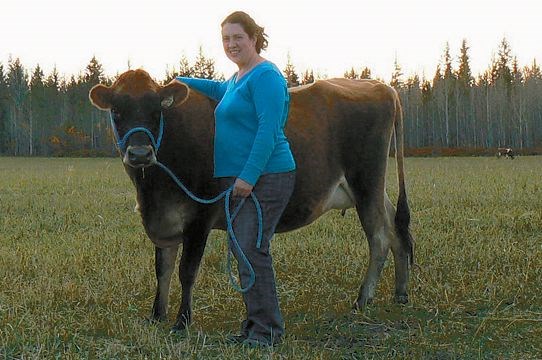Nine years ago Lesley McConnachie got her first taste of raw milk and never looked back.
The local farmer had adopted a rescue jersey cow and when it began producing more milk than it could feed its calves, McConnachie and her husband decided to drink the excess milk themselves, unprocessed. They quickly fell in love with the taste, which they say is much better than the pasteurized store-bought variety, and began to notice health benefits as well.
"I see my friends in town and their kids are constantly sick, our kids are not," McConnachie said. "The only time they started getting sick was when I stopped milking for the winter, they started getting lots of colds and stuff. As soon as we started again, nothing."
McConnachie believes the pasteurization process -- which involves heating milk for a certain length of time, then immediately cooling it -- not only kills off any bad bacteria in the milk, it also destroys the good bacteria.
Jim Green, an environmental health officer with Northern Health, said although it can be appealing to consume organic or natural products like raw milk, it comes with a significant health risk.
"It's really difficult to provide a sterile milk directly from an animal," he said. "It can be contaminated because the animal is sick, sanitization in the general milking parlor, contamination by the milker, issues with the water that's being used for cleaning the equipment and rinsing. There's all these different types of places where some contamination can happen."
Green notes that pathogens such as listeria, salmonella, E. coli and campylobacter can all flourish in raw milk. He said even routine testing of raw milk facilities won't make the product safe, because conditions can change so quickly.
The B.C. Centre for Disease Control calls pasteurization "one of the greatest advances in public health of the 20th century" on its website and strongly advises against consuming unpasteurized milk. The government agency also says there's no evidence of any health benefits that come from drinking the product.
McConnachie, who also makes butter and cheese curds with her raw milk, said she's very particular about keeping everything sanitary during the milking process and is confident her milk is safe.
"If you drink clean milk, you shouldn't have a problem with it," she said. "There's a risk to eating everything."
Although Northern Health recommends against consuming raw milk, there's nothing they can or will do to private citizens like McConnachie and her family who drink the milk they produce on their own farm.
Distribution is another matter all together. Since 1991 it's been illegal in Canada to sell or even give away any unpasteurized dairy products, however it remains legal in a handful of American states.
McConnachie had a scuffle with Northern Health in 2010 over a raw milk herd-share she was running at her family's Hunny-Do Ranch. It involved people buying a share in the herd and paying a portion of the upkeep of the cows to gain access to the milk.
The ranch eventually shutdown the co-operative for family reasons after the birth of their fourth child -- McConnachie said she was tired of freezing her fingers milking in the winter -- but the family still consumes their own raw milk.
"People want real food," McConnachie said. "I recently read a quote on Facebook, 'People eat a lot of food-like products.' "
If a public health agency gets reports of people distributing raw milk or products derived from it, they have an obligation to investigate. Greg Thibault, the manger of public health protection for Northern Health, said the process begins by educating producers but can escalate if people persist in selling or giving away raw milk products.
"Quite a number of the individuals that we encounter say, 'I want to make goat cheese and sell it at the farmer's market,' often they're not aware it has to be made from a pasteurized product or pasteurized in the process or made safe in the process," Thibault said.
Although no one has been charged with a crime as a result of selling raw milk in northern B.C., there have been court cases in other Canadian jurisdictions. Just last month in Ontario Michael Schmidt went to court to appeal his 2011 conviction for selling raw milk. His original sentence included a $9,150 fine and a year of probation. The appeal is pending.
McConnachie estimates that over 100 families in the region consume raw milk through either by drinking the milk on they produce on their own farms or by joining co-operatives like the one that used to run out of Hunny-Do.
Thibault said Northern Health has no ongoing enforcement action against any groups in the area.



